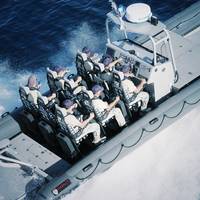Mitigation of Shock & Vibration on Fast Boats

For some time now, military agencies and specialist organizations around the globe have driven the evolution of high speed watercraft. As a trickle-down effect fast response craft now serve roles once typically serviced by displacement designs including pilot boats, dive boats, crew boats and offshore support. During high speed operations the repeated shocks (RS) and whole body vibrations (WBV) of this harsh environment are transmitted to the passengers, operators and crew aboard, creating avenues of owner liability if not addressed.
CIGI's New Man to Lead Arctic Governance Project

The Centre for International Governance Innovation (CIGI) appoints John Higginbotham as senior fellow. At CIGI, an independent, non-partisan think tank on international governance, Mr. Higginbotham will play a key role in leading CIGI’s global security project on Arctic governance. Mr. Higginbotham is also a senior distinguished fellow at Carleton University, where has he been working on the Arctic, China and the United States as well as a transportation studies initiative drawing on the strengths of Carleton’s Faculties of Business, Public Administration and Engineering.
Arctic Policy Brief Issued by CIGI
‘Great Melt’ in the Arctic calls for increased co-operation between Canada and United States, policy brief argues. The “great melt,” an unprecedented geophysical change, in the Arctic is cause for heightened leadership, attention and cooperation between Canada and the United States. Without a national strategic vision, current policies are inadequate to protect economic and environmental interests, argues a new policy brief issued by The Centre for International Governance Innovation (CIGI). In Canada-US Arctic Marine Corridors and Resource Development, global governance experts John Higginbotham, Andrea Charron and James Manicom argue that “clear imperative” exists for the two North American countries to develop their marine resource and community potential for the Arctic.







